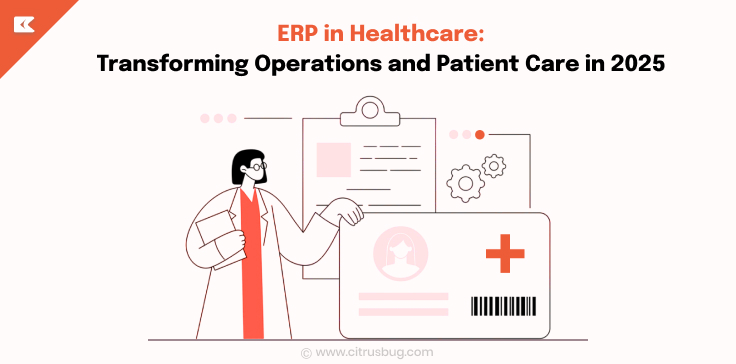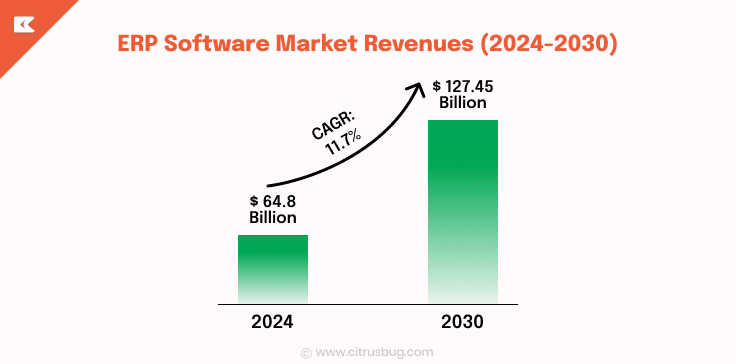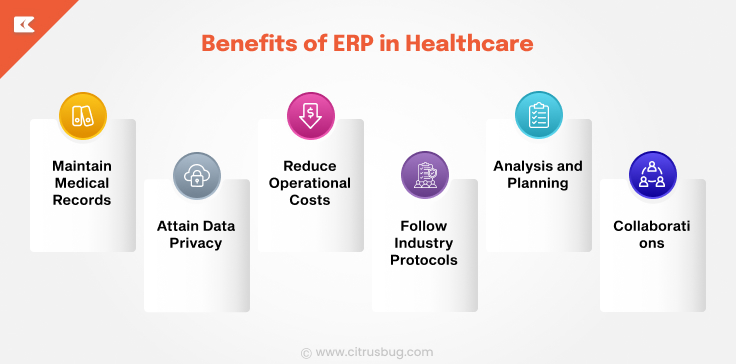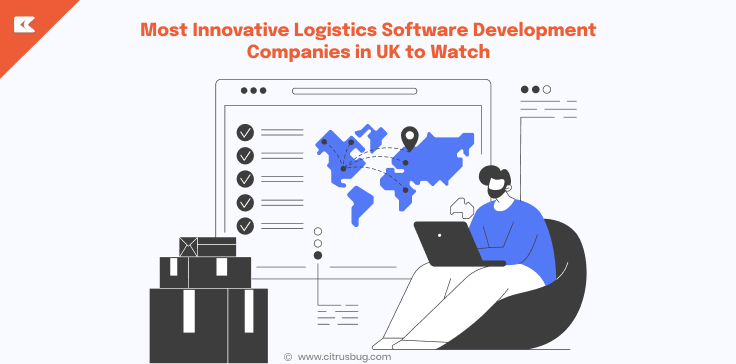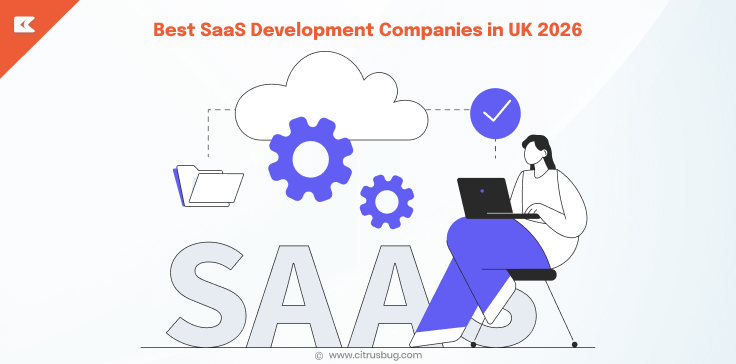ERP in Healthcare: Transforming Operations and Patient Care in 2025
- April 25, 2025
-
1887 Views
- by Ishan Vyas
Table of Contents
- What are ERP Systems?
- ERP in Healthcare: Streamlining Patient Care and Efficiency
- Role of ERP Software for the Healthcare Industry
- Benefits of ERP in Healthcare
- Features of Healthcare ERP
- Application of ERP Systems in Healthcare
- Cost to Build ERP Software for the Healthcare Industry
- The Future of ERP in Healthcare
- Citrusbug’s Healthcare Software Development Services
- Conclusion
Operational efficiency and patient-centric healthcare are not optional in the modern healthcare environment. They are important for success and survival. In order to provide better patient experiences leveraged by effortless cost management and regulatory adherence, healthcare organisations need to adopt advanced technological solutions in the face of ever-increasing pressures.
ERP systems are redefining the capabilities of service delivery and resource planning for hospitals. Transformation is being witnessed in the hospital management through an increase in the global ERP market, which is expected to touch $64.83 billion in 2024 and sustain 11.7% CAGR till 2030.
ERP systems are essential to modern business operations. They integrate custom software services and manage complex processes in healthcare, finance, HR management, inventory, supply chains, and HR.
This blog will provide an in-depth exploration of ERP’s transformative power, with a focus on its many applications and benefits. Understanding the nuances of ERP systems for hospitals, and the broader ERP in the healthcare system, is essential for startup owners and CXOs working in the healthcare industry. This will help them make strategic decisions and achieve sustainable growth.
What are ERP Systems?
While previously systems operated independently, the consolidation of different enterprise functions to an ERP system creates a new epoch in the operational management paradigms of an organisation. Enterprise Resource Planning systems (ERP Systems) serve as advanced software solutions that aggregate several business functions of an organization into a single system.
Breaking down data silos results in better integration of several processes like the interface of finance with human resources or operations with supply-chain management.
- Core Functionality: ERP steering systems have centralized systems that serve as the primary repository of business information. Thus, information is available instantly which aids decision making.
- Process Integration: ERP systems software improves business processes by combining them into a single system, thus simplifying workflows, minimizing duplication, and improving productivity.
- Flexibility and Scalability: Contemporary enterprise resource planning solutions are built to accommodate expansion and changing requirements of the business.
- Real-Time Analytics: Strategic reporting, analysis, and planning capabilities are strongly offered by ERP systems. They aid in strategic planning by offering insights on key performance indicators.
Strategic caretaking of complicated operations in the healthcare system is made possible through ERP software. It enhances the utilization of resources and optimization of patient care.
ERP in Healthcare: Streamlining Patient Care and Efficiency
While the structure of an ERP system is more or less standard across different industries, the implementation of ERP in healthcare concerns is fairly specialized. ERP in healthcare is more involved than just providing resource management; it addresses the unique requirements of healthcare providers.
It embraces both clinical and administrative tasks to ensure that operational as well as business functions are fully interrelated and performed accurately. In healthcare ERP, we think of a system that brings together the issues of control, compliance, security, safety, and operational efficiency.
- Patient-Centric Approach: The journey undertaken by the patient within the healthcare organization is made fundamentally easier by effective healthcare ERP systems which improve administrative services access.
- Regulatory Compliance: ERP technologies help healthcare organizations comply with HIPAA and other privacy standards relating to sensitive information, offering protection and security as required.
- Operational Efficiency: Proper control of resources within any healthcare institution is crucial, and ERP systems greatly assist in the organization of inventory management, supply chain, and finances.
- Data-Driven Decision Making: Improved visualisation of Analytics features using artificial intelligence enables instant access to streaming data, which, in turn, allows optimised decision-making regarding the services offered to patients and operational activities by the organisation’s leadership.
Role of ERP Software for the Healthcare Industry
The scope of ERP’s contribution in relation to the digital transformation of the healthcare industry is vast as it profoundly transforms processes. Indeed ERP software for healthcare industry integrates all the aspects of an institution like a nervous system does to a body.
In the healthcare domain, an ERP system provides all-in-one services for effective resource management that relieves inefficiency and human error. With proper ERP software vital information which is necessary for enhancing patient care access during providing services is integrated improving administrative efficiency.
- Unified Data Management: With an ERP system, patient, financial, and operational information is integrated into one platform. This eliminates data silos, improves accuracy, and makes information more accessible.
- Task Automation: Routine processes like appointment scheduling, billing, and inventory management for medical supplies cause many manual errors. After automation, employees have more time to shift their efforts to the patient’s direct care.
- Supply and Demand Management: Managing pharmaceuticals, medical supplies, and equipment is important in the health care sector. With Enterprise Resource Planning (ERP) systems, hospitals have up-to-date information on the availability and amount of inventory on store.
- Financial and Revenue Management: Billing, financial reporting, claims, and cross finance expenses get ERP and lead to efficient revenue cycle management with minimal bureaucratic overheads.
Compliance with Legal Norms and Risk Control: Using ERP systems improves compliance with the healthcare industry regulations which reduces the possibility of penalties alongside ensuring data privacy.
Benefits of ERP in Healthcare
ERP systems facilitate the advancement of patient care outcomes and healthcare services in a multifaceted manner. The integration of ERP within the healthcare sector helps organizations for:
Maintain Medical Records
Through utilizing a healthcare ERP system, end users will be able to add, update, access, and monitor all medical records of every patient. This system will alleviate time complexities which will, in turn, help staff concentrate more on patient care.
Attain Data Privacy
A custom made designation permits the addition of authorization and permission prerequisites for every user at a particular role in a healthcare facility. This guarantees the security of data from online theft and breaches. Moreover, the protection of patient information helps offer enhanced services to patients.
Reduce Operational Costs
In a broad spectrum, aligned inventory and labor costs need to be balanced to allow smooth functioning in the healthcare sector. A specialized cloud based ERP system for healthcare automates accounting, inventory, and human resources to a single housed database. With this system, healthcare providers have more control over monitoring expenditures, allowing for detailed allocations to staff costs.
Follow Industry Protocols
Policies and procedures within a healthcare facility must be strictly adhered to since any deviation, even minor, may result in catastrophic outcomes. ERP allows organizations to guarantee that all processes are safe, clear, and routinely checked. Everything will be organized including legacy systems, record-keeping, audits, and upgrades.
Analysis and Planning
Analytics dashboards that provide real-time data on patient visits, system costs, inventory, labor, and other parameters enable you to evaluate your healthcare services. This data is useful for the organization’s top management since it indicates where there are gaps, and provides guidance on how to better serve their patients.
Collaborations
In small and big healthcare facilities, various processes overlap which may be difficult to manage. If your team knows how to implement an enterprise system, the process becomes easy and efficient. Collaborating with them in a centralized system allows everyone to be connected and informed.
Features of Healthcare ERP
As with any sector, the healthcare industry has unique requirements which are systematically solved by the use of healthcare ERP software. Some of the features of ERP in healthcare includes:
- Patient Management: The ability to integrate a patient flow system, a patient portal, automation of appointment booking, a Centralized databases for patient records, file transfers, and other features is paramount.
- Inventory Management: Managing the stock of medical protocols, drugs, apparatus, and their procurement as well as distribution.
- Financial Management: Classifying and maintaining accounts receivable, payable, billing, claims, financial reports, budgeting and other revenue cycle activities.
- Human Resources Management: Scheduling and paying staff, distributing benefits, and managing staff talent.
- Supply Chain Management: Centralized management of distribution, where vendors are registered.
- Reporting and analytics: Dashboards with predesigned reports, analytics, and fundamental business intelligence tools accessible in real time. Reports can be generated based on configured templates.
- Compliance Management: Following through tools of managing an audit or business compliance process in an organization concerning rules and regulations such as HIPAA.
- EHR Integration: Integration of all electronic health records to allow for proper management of information concerning patients that enhance clinical operations.
- Mobile Accessibility: Permit clinicians and nurses to carry vital details through mobile gadgets.
- Customization and Configurability: Changing of system processes to suit the order and manner an organization/the clients perform their work.
Application of ERP Systems in Healthcare
The functionality of ERP systems over different sectors within the healthcare industry makes it a core necessity given that each has different operational requirements. Let us examine how ERP adds value to some of the areas in greater detail.
Hospitals:
ERP systems enhance management of patient admissions, discharges, and transfers. For example, integrated real-time bed management systems, increase patient flow and minimize wait times by resource optimization. As a result, financial processes are improved with automated billing and claims processing, elimination of manual errors improves revenue cycles.
Additionally, ERP systems support adherence to compliance regulations by managing documentation and audit trails, thus mitigating risk of compliance penalties. A case in point, a hospital can track and report on the administration of medications to validate compliance with safety standards.
Clinics:
In clinics, ERP systems improve the appointment scheduling process thus optimizing staff utilization and reducing no show appointments. With system integrated patient records, retrieval of patients’ medical histories is instantaneous which leads to better healthcare outcomes. Revenue collection is ensured with automated billing that eliminates manual errors.
Uninterrupted patient care is ensured with timely availability of essential supplies due to efficient inventory management. An example of this is a clinic with an ERP system that automatically texts and emails appointment reminders, improving patient attendance.
Laboratories:
Laboratories utilize ERP systems for compliance and regulation, sample tracking, record management, and test result processing. Furthermore, Real Time (RT) Inventory control of testing reagents and supplies eliminates outages and error in testing caused by time delays.
Automation of report generation in ERP systems simplifies quality standard reporting and auditing, increasing efficiency. For example, a lab can track a sample using an ERP system from collection to reporting which guarantees accurate chain-of-custody and reporting.
Pharmaceutical Firms:
Pharmaceutical companies implement ERP systems for drug development, manufacturing, and distribution processes. ERP systems will supervise raw material inventory and subsequently schedule production for clinical trial phases and inventory.
Regulatory compliance will also be handled with automated documents and audit trials. In addition, auditing in SCM will be enhanced by real-time supervision of shipment and inventory levels. For example; an ERP can monitor drug life from the initial step of testing, through the manufacturing process, and up to the distribution stage while fulfilling all regulatory requirements.
Medical Supply Companies:
Medical supply companies improve their warehouse, logistic, and vendor relations through the use of ERP systems. Active monitoring of inventory balances and supplies schedule prevents stockouts and guarantees timely deliveries. ERP systems further enhance supplier relations by automating procurement processes and reducing costs.
Logistics can be enhanced through planning of delivery routes and through the tracking of deliveries. An example would be an ERP system that predicts the need for medical supplies based on hospital usage rates.
ERP Hospital Management System:
An exhaustive ERP hospital management system is the centerpiece of operational effectiveness mechanics. It encompasses all the activities of the hospital, including the provision of care services and the management of finances. The consolidated database in these systems
facilitates effective governance as it provides for enhanced supervision and enables swift response to emerging challenges.
To summarize, ERP is a key enabler in the transformation of healthcare systems. It maximizes efficiency in operations, improves the quality of healthcare services, and enhances compliance with regulations. It is necessary for healthcare institutions to adopt robust ERP systems in order to realize improved performance in several areas.
For owners of startups and CXOs, grasping the importance of enterprise resource planning strategy for hospitals and making the correct investments is central to long standing growth and achievement.
Cost to Build ERP Software for the Healthcare Industry
Each healthcare ERP software will cost an average of around 50,000 to 750,000 for implementation. Initial costs will comprise of customization, software licensing, hardware peripherals, integration, and training. Also, other expenses include subscriptions, maintenance, and support.
Larger and complex businesses will encounter higher costs; Smaller and mid-size businesses will find value in standard solutions. To ensure successful development and deployment of the health care ERP system in alignment with development goals, comprehensive planning and budgeting is essential.
Cost to develop software for implementing ERP systems in healthcare varies with the size of the business.
The Future of ERP in Healthcare
With the development of new modern technologies, the role of ERP systems in the health services industry will further grow. The technological advancement in the field ensures that all of the market’s ever-growing requirements are satisfied. Technological innovations and further developments will shape the future of healthcare ERP which will include: –
- Artificial Intelligence (AI) and Machine Learning (ML): Enhancing predictive analytics, automation, and decision making for improved patient outcomes and operational efficiency.
- Internet of Things (IoT) Integration: Enabling the collection, monitoring, and analysis of data through connectivity of medical devices and equipment in real time.
- Blockchain Technology: Strengthening data security, interoperability, and the secure sharing of information between patients and healthcare providers.
- Cloud-Based Solutions: Improving accessibility, scalability, flexibility, and adaptability of healthcare organizations to changing needs while reducing costs associated with IT infrastructure.
- Enhanced Interoperability: The ability to exchange data seamlessly without barriers from other healthcare systems enhances care coordination and improves patient outcomes.
- Advanced Analytics and Reporting: Providing insights pertaining to operational performance, patient outcomes, and financial metrics ensures that decisions made are fact based.
- Increased Mobile Capabilities: Granting mobile access to vital information and tools for healthcare workers markedly increases responsiveness and improves efficiency.
- Automation of Administrative Tasks: The reduction of manual and error-based work processes enables greater attention to be given to patient care.
- Focus on Patient Engagement: The optimization of communication tools such as patient portals for engagement purposes enhances care coordination.
- Cybersecurity Enhancements: Increased protective measures against cyber attacks on sensitive patient data.
- Predictive Maintenance: The cost and downtime of the equipment can be minimized by logging and anticipating maintenance requirements using ERP systems.
- Remote Patient Monitoring Integration: The management of patients using data obtained from remote monitoring devices enhances the management of patients and lowers hospital readmission rates.
- Supply Chain Resilience: Using ERP systems to manage supply chain disturbances ensures the critical supplies are provided on time.
The impending digital revolution in the healthcare sector is apparent as ERP systems are spearheading the charge. For those looking for ERP solutions tailored for the healthcare industry, seasoned vendors are the best source.
Successfully adopting enterprise resource planning systems will lead to improvements in efficacy and efficiency within the healthcare industry. The implementation of an ERP system within a hospital will streamline the workflows, which, in turn, will improve the quality of patient care, subsequently improving the overall operational effectiveness of the facilities.
Citrusbug’s Healthcare Software Development Services
Citrsbug Technolabs offers customized healthcare software development services for your organization’s needs in the intricate healthcare ecosystem. Our custom-developed ERP systems automate everything from patient management to financial reporting while achieving compliance and efficiency. We understand the need for data management and build strong EHR / EMR systems for patient data management which is easy and secure.
Our solutions facilitate remote consultations and patient monitoring as telemedicine grows. We also develop intuitive mobile healthcare applications for patients and professionals for easy on-the-go access. Data analytics are used by us to inform decisions on resource utilization, patient, and optimal outcomes which improves healthcare services.
Maintaining primary focus on regulatory compliances and data security alongside HIPAA is a must. Our integration services offer complete seamless interoperability with other existing systems to ensure a consolidated healthcare system ecosystem. Working with Citrusbug Technolabs means access to a dedicated team focused on innovative solutions that are compliant and efficient health care software solutions tailored for each client.
Conclusion
For those looking into developing a custom solution, custom app development services specialized in healthcare may offer great opportunities. Knowing the complexities of EHR system development aids in devising an effective ERP strategy to develop a health system that is truly interoperable.
Organizations can leverage the power of enterprise resource planning ERP to transform their approach towards healthcare services, enabling greater efficiency. Do not forget an ERP enterprise resource planning is a tool and a powerful one when wielded appropriately. Implementation of ERP in healthcare goes beyond simply installing it; meticulous planning of every detail is paramount.
Is your organization ready to revolutionize its operations with a powerful integrated ERP system? Contact Us Now. Our team will assist you in addressing all the intricacies involving ERP implementation while tailoring the solution to suit your organization’s requirements.





 SaaS Development
SaaS Development Web Application Development
Web Application Development Mobile Application Development
Mobile Application Development Custom Software Development
Custom Software Development Cloud Development
Cloud Development DevOps Development
DevOps Development MVP Development
MVP Development Digital Product Development
Digital Product Development Hire Chatbot Developers
Hire Chatbot Developers Hire Python Developers
Hire Python Developers Hire Django Developers
Hire Django Developers Hire ReactJS Developers
Hire ReactJS Developers Hire AngularJS Developers
Hire AngularJS Developers Hire VueJS Developers
Hire VueJS Developers Hire Full Stack Developers
Hire Full Stack Developers Hire Back End Developers
Hire Back End Developers Hire Front End Developers
Hire Front End Developers AI Healthcare Software Development & Consulting
AI Healthcare Software Development & Consulting Healthcare App Development
Healthcare App Development EHR Software Development
EHR Software Development Healthcare AI Chatbot Development
Healthcare AI Chatbot Development Telemedicine App Development Company
Telemedicine App Development Company Medical Billing Software Development
Medical Billing Software Development Fitness App Development
Fitness App Development RPM Software Development
RPM Software Development Medicine Delivery App Development
Medicine Delivery App Development Medical Device Software Development
Medical Device Software Development Patient Engagement Software Solutions
Patient Engagement Software Solutions Mental Health App Development
Mental Health App Development Healthcare IT Consulting
Healthcare IT Consulting Healthcare CRM Software Development
Healthcare CRM Software Development Healthcare IT Managed Services
Healthcare IT Managed Services Healthcare Software Testing services
Healthcare Software Testing services Medical Practice Management Software
Medical Practice Management Software Outsourcing Healthcare IT Services
Outsourcing Healthcare IT Services IoT Solutions for Healthcare
IoT Solutions for Healthcare Medical Image Analysis Software Development Services
Medical Image Analysis Software Development Services Lending Software Development Services
Lending Software Development Services Payment Gateway Software Development
Payment Gateway Software Development Accounting Software Development
Accounting Software Development AI-Driven Banking App Development
AI-Driven Banking App Development Insurance Software Development
Insurance Software Development Finance Software Development
Finance Software Development Loan Management Software Development
Loan Management Software Development Decentralized Finance Development Services
Decentralized Finance Development Services eWallet App Development
eWallet App Development Payment App Development
Payment App Development Money Transfer App Development
Money Transfer App Development Mortgage Software Development
Mortgage Software Development Insurance Fraud Detection Software Development
Insurance Fraud Detection Software Development Wealth Management Software Development
Wealth Management Software Development Cryptocurrency Exchange Platform Development
Cryptocurrency Exchange Platform Development Neobank App Development
Neobank App Development Stock Trading App Development
Stock Trading App Development AML software Development
AML software Development Web3 Wallet Development
Web3 Wallet Development Robo-Advisor App Development
Robo-Advisor App Development Supply Chain Management Software Development
Supply Chain Management Software Development Fleet Management Software Development
Fleet Management Software Development Warehouse Management Software Development
Warehouse Management Software Development LMS Development
LMS Development Education App Development
Education App Development Inventory Management Software Development
Inventory Management Software Development Property Management Software Development
Property Management Software Development Real Estate CRM Software Development
Real Estate CRM Software Development Real Estate Document Management Software
Real Estate Document Management Software Construction App Development
Construction App Development Construction ERP Software Development
Construction ERP Software Development





